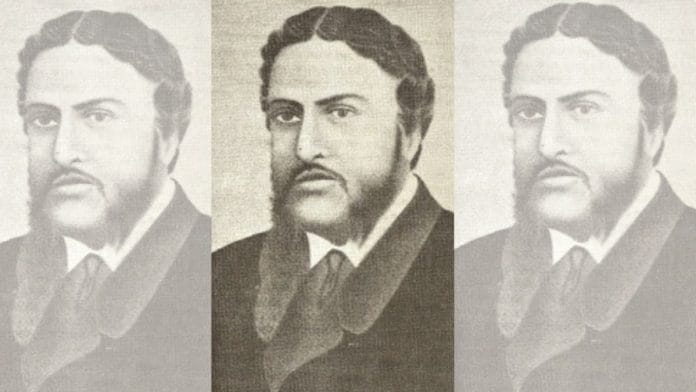The poet, playwright and non-conformist Michael Madhusudan Dutt is perhaps best remembered for ushering in a renaissance in Bengali literature. He is credited for introducing English Byronic sonnets into Bengali literature and introducing free verse. One ninety-nine years after his birth on 25 January, Dutt’s contribution to the Humanities remains unparalleled.
Influenced by Shakespeare and the Romantic writers, Dutt authored his first Bengali play, Sharmistha, in 1858, writing it entirely in blank verse—a style alien to Bengali literature until then.
Dutt’s writing draws extensively from classical European literature. His Meghnad-Badh Kavya (The Slaying of Meghnad), published in 1861, is considered one of India’s best modern poems.
It was written in nine cantos of blank verse and was influenced by John Milton’s Paradise Lost (1667). Here, he replaced the Bible with the Ramayan and approached it with a fresh take, one where Ravan, the ruler of Lanka, is the hero.
“The poem is rising into splendid popularity. Some say it is better than Milton—that is all bosh—nothing can be better than Milton; many say it licks Kalidasa; I have no objection to that. I don’t think it impossible to equal Virgil, Kalidasa, and Tasso,” wrote Dutt in a letter to a friend.
If his professional life was marked by the brilliance of his poetry and plays, then his personal life was the exact opposite, as he navigated one crisis after another until he died on 29 June 1873 in penury.
Also read: Before PS:1 and Baahubali, Sohrab Modi gave India one of its first big-budget epics
An eccentric genius
Dutt was born on 25 January 1824, in the village of Sagardari in East Bengal (now Bangladesh)’s Jessore district, to lawyer parents Rajnarayan Dutt and Jahnabi Devi. He attended Hindu College (now Presidency University) in Kolkata, intending to become a barrister like his parents. Dutt showed a flair for languages from an early age: He learned Bengali and Sanskrit at home and Persian from a Muslim tutor at a mosque near his family’s manor. Dutt’s education primarily happened in English, and he received extra classes at home per his father’s wish. He started writing English poetry in 1858.
Sceptical to religious ceremonies and caste-based arranged marriages, he rebelled by converting to Christianity when his father tried to force him to marry. Dutt had to leave his alma mater because of his conversion and subsequently joined Bishop’s College to study Latin, Greek, and the classics. His actions led to a fallout with his family, and he was soon disinherited.
Later, he moved to Madras (now Chennai), where he married Rebecca Thompson McTavish, a 17-year-old Anglo-Indian woman. It is after his marriage to McTavish that Dutt assumed the name Michael. Interestingly, he was the first Bengali who dared to marry a woman of European descent. He then began his twin careers as a teacher and journalist. In Madras, he published two poetry books in English–The Captive Ladie and Visions of Past—under the pseudonym of Timothy Penpoem.
After beginning his literary career with English works, he shifted his focus to Bengali. The shift came after John Elliot Drinkwater Bethune, a barrister and champion of women’s education, counselled Dutt to write more in his mother tongue after reading Captive Ladie. The Nobel laureate Rabindranath Tagore called his epic Meghnad-Badh Kavya a “rare treasure in Bengali literature”, through which “the richness of Bengali literature has been proclaimed to the wide world.”
In 1856, he left his wife and children, moved to Kolkata, married Emelia Henrietta Sophie White, and shifted to London to study law in 1862. But after facing racism, he returned to Kolkata and started a failing law practice.
By then, he had lost most of his wealth. Living in abject poverty, he was helped by the Bengali writer Ishwar Chandra Vidyasagar who sent him money to sustain himself. He became a practising barrister in 1866.
He pioneered a new direction in Bengali poetry by showing how to express one’s feelings and wishes. Krsnakumari (1861), a tragedy based on a Rajput folk tale, was written along these lines, as were Vrajangana (1861) and Virabgana (1862).
Also read: Ishar Singh–first Sikh soldier to receive Victoria Cross for heroics in Waziristan
A tragic fall
His extravagant lifestyle and alcoholism led to him giving up his law practice within three years. In this time, he wrote Hectarbadh in 1871, which he modelled after Homer’s Iliad (which dates back to 700 BC) and his last composition, Mayakanan, in 1873.
He passed away in 1873 at the age of 49. Going mostly unnoticed for about a decade after his passing, Madhusudan’s work gained worldwide recognition after being discovered and praised by contemporaries like Tagore. His writings began to be hailed as among the finest in Bengal. In 2021, authors Namita Gokhale and Malashri Lal wrote a play, Betrayed by Hope, on the poet’s life.
In Bangladesh, his birthplace of Sagardari has now been converted into a national historic site. An academy, which houses Dutt and his parents’ legacy, was named after him and continues to see heavy footfall to this day.
(Edited by Zoya Bhatti)






